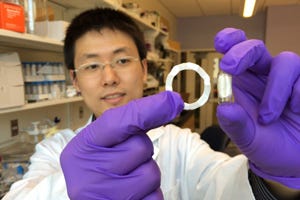Researchers at MIT's Koch Institute for Integrative Cancer Research and Massachusetts General Hospital (MGH) have created a polymer gel that could enable the development of long-acting devices that reside in the stomach, including orally delivered capsules that can release drugs over a number of days, weeks, or potentially months following a single administration. This breakthrough could go a long way toward improving patient adherence to long-term therapies for chronic illnesses.
July 27, 2015
Researchers at MIT's Koch Institute for Integrative Cancer Research and Massachusetts General Hospital (MGH) have created a polymer gel that could enable the development of long-acting devices that reside in the stomach, including orally delivered capsules that can release drugs over a number of days, weeks, or potentially months following a single administration. This breakthrough could go a long way toward improving patient adherence to long-term therapies for chronic illnesses. The World Health Organization estimates that only 50% of patients in developed countries comply with medication requirements, costing the United States alone an estimated $100 billion every year, the bulk of which comes in the form of unnecessary hospitalizations.
|
Shiyi Zhang, a postdoc at the Koch Institute, holds a |
The researchers designed a supramolecular elastomer gel by combining poly(acryloyl 6-aminocaproic acid) and poly(methacrylic acid co-ethyl acrylate), a pharmaceutical-grade polymer that resists digestion, reports ChemistryWorld. The gel can be cut to various sizes and recovers its shape quickly after being stretched to three times its original length.
The polymer is pH-responsive: It is stable in the acidic stomach environment but dissolves in the small intestine's near-neutral pH, allowing for safe passage through the remainder of the gastrointestinal tract. The material is also elastic, allowing for the compression and folding of devices into easily ingestible capsules—meaning this polymer can be used to create safe devices designed for extremely prolonged residence in the stomach, according to MIT News.
Koch Institute research affiliate Giovanni Traverso, also a gastroenterologist at MGH and an instructor at Harvard Medical School, and Robert Langer, the David H. Koch Institute Professor at MIT and a member of the Koch Institute have published a paper in Nature describing their research.
MIT is negotiating an exclusive license agreement with Lyndra, an early-stage biotechnology company developing novel oral drug-delivery systems, for this and related technologies.
About the Author(s)
You May Also Like



